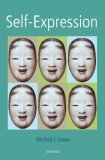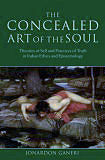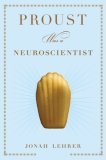February 18, 2008
Self-Expression by Mitchell Green (Oxford University Press, 2008).
 (“Look Inside” available at Amazon.com)
(“Look Inside” available at Amazon.com)
Book description:
Mitchell S. Green presents a systematic philosophical study of self-expression – a pervasive phenomenon of the everyday life of humans and other species, which has received scant attention in its own right. He explores the ways in which self-expression reveals our states of thought, feeling, and experience, and he defends striking new theses concerning a wide range of fascinating topics: our ability to perceive emotion in others, artistic expression, empathy, expressive language, meaning, facial expression, and speech acts. He draws on insights from evolutionary game theory, ethology, the philosophy of language, social psychology, pragmatics, aesthetics, and neuroscience to present a stimulating and accessible interdisciplinary work.
Comments (0)
- mind,new books,self
February 4, 2008

The Concealed Art of the Soul: Theories of the Self and Practices of Truth in Indian Ethics and Epistemology by Jonardon Ganeri combines two of my favorite subjects: Indian philosophy and ‘theories of the self,’ plus it is very well written, so I’ve been enjoying it quite a lot. Here’s a small sample:
Only at our peril does each of us conclude too soon that we have found the great truth about ourselves, the truth of who we are; it takes time for that truth to form and organize itself within us. The nuanced truth about ourselves, our condition, our lives and aspirations, should not come too soon, before we are receptive to it, before we can let it ‘blow through’ us. Indeed, were it to come too soon, we would not even recognize it as such; or else, it would mislead us. When it does come, its effect will be transformative; indeed, its arrival is only the beginning. If receptivity — openness to the truth — is one hard-won intellectual virtue, then so too is the capacity to allow the truth to ‘keep growing deep down’…. (p. 56)
Comments (0)
- self
January 16, 2008
Some additions to the list in the sidebar – books on the self published 2007-2008.
2008
Andre Masson and the Surrealist Self by Clark V Poling (New Haven, Conn.; London: Yale University Press, 2008) forthcoming – April 2008
Belief about the Self: A Defense of the Property Theory of Content by Neil Feit (Oxford; New York: Oxford University Press, 2008) forthcoming – June 2008
Crossing Horizons: World, Self, and Language in Indian and Western Thought by Shlomo Biderman (New York: Columbia University Press, 2008) available
Cult of the Will: Nervousness and the Forging of a Modern Self in Germany, 1890-1914 by Michael A. Cowan (University Park, Pa.: Pennsylvania State University Press, 2008) forthcoming – June 2008
The Phenomenal Self by Barry Dainton (Oxford: Oxford University Press, 2008) forthcoming – May 2008
2007
Concepts of the Self (Key Concepts) 2nd ed. by Anthony Elliott (Cambridge: Polity Press, 2007)
Feeling, Being and the Sense of Self: A New Perspective on Identity, Affect and Narcissistic Disorders by Marcus West (London: Karnac, 2007)
Narrative and Understanding Persons (Royal Institute of Philosophy Supplement) ed. by Daniel D. Hutto (Cambridge; New York: Cambridge University Press, 2007)
Self and Social Change by Matthew Adams (Los Angeles; London: Sage, 2007)
Self-Knowing Agents by Lucy O’Brien (Oxford; New York: Oxford University Press, 2007)
Subjectivity: Ethnographic Investigations (Ethnographic Studies in Subjectivity) ed. by João Gulherme Biehl, Byron Good, Arthur Kleinman (Berkeley: University of California Press, 2007)
Comments (0)
- new books,self
January 8, 2008
Included in the new batch of Metapsychology reviews are a review of ‘The Self?,‘ a collection of papers edited by Galen Strawson (Wiley-Blackwell, 2005), and a review of ‘Human Nature: The Categorical Framework’ by P.M.S. Hacker (Wiley-Blackwell 2007).


Comments (0)
- philosophy of mind,self
November 22, 2007
 I have two personal “action items” as a result of reading Proust Was a Neuroscientist
I have two personal “action items” as a result of reading Proust Was a Neuroscientist . The first is to read Virginia Woolf for her insights into self and consciousness.
. The first is to read Virginia Woolf for her insights into self and consciousness.
Here is an excerpt from the chapter on Virginia Woolf (p. 182):
But how do we endure? How does the self transcend the separateness of its attentive moments? How does a process become us? For Woolf, the answer was simple: the self is an illusion. This was her final view of the self. Although she began by trying to dismantle the stodgy nineteenth-century notion of consciousness, in which the self was treated like a “piece of furniture,” she ended up realizing that the self actually existed, if only as a slight of mind. Just as a novelist creates a narrative, a person creates a sense of being. The self is simply our work of art, a fiction created by the brain in order to make sense of its own disunity. In a world made of fragments, the self is our sole “theme, recurring, half remembered, half foreseen.” If it didn’t exist, then nothing would exist. We would be a brain full of characters, hopelessly searching for an author.

My second action item – based on the chapter on Stravinsky – is to listen to “difficult” or unfamiliar music. I’m not sure if this applies to other art forms besides music, but I was fascinated by the account of Stravinsky’s ‘Rite of Spring’ as “simulated madness” that the mind later learned to listen to – explained neuroscientifically by the release of dopamine in response to surprising sounds. (“New Sounds” from WNYC is a good source for contemporary new music. For “simulated madness” – maybe watching a David Lynch film like ‘Inland Empire’ provides a similar experience?)
Lehrer writes (p. 142-143): “If the art feels difficult, it is only because our neurons are stretching to understand it. The pain flows from the growth… If not for the difficulty of the avant-garde, we would worship nothing but that which we already know.”
‘Proust Was a Neuroscientist’ at Google Books
Author Jonah Lehrer blogs at the Frontal Cortex.
Comments (0)
- culture,mind,self
 (“Look Inside” available at Amazon.com)
(“Look Inside” available at Amazon.com)






